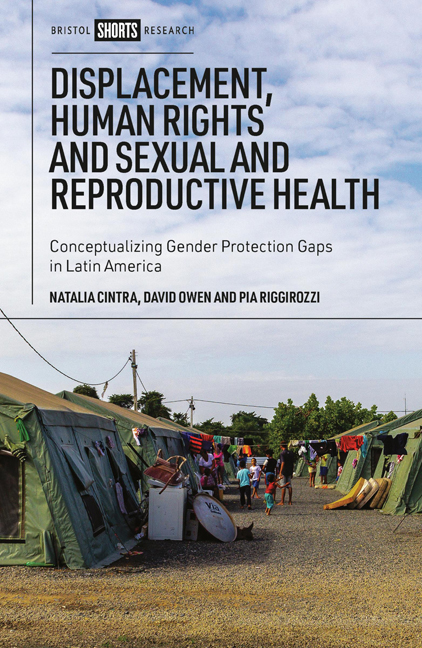 Displacement, Human Rights and Sexual and Reproductive Health
Displacement, Human Rights and Sexual and Reproductive Health Book contents
- Frontmatter
- Dedication
- Contents
- List of Figures and Tables
- Acknowledgements
- Introduction
- One The Gendered Character of Forced Migration
- Two Problematizing the Migrant– Refugee Distinction in Latin America
- Three Latin American Normative Frameworks of Migration and Asylum
- Four Protecting the Human Right to Health of Women and Girls from Venezuela as Necessary Fleers
- Five Responsibility and the Ethics of Forced Displacement in South America
- Conclusion
- Notes
- References
- Index
Introduction
Published online by Cambridge University Press: 18 January 2024
- Frontmatter
- Dedication
- Contents
- List of Figures and Tables
- Acknowledgements
- Introduction
- One The Gendered Character of Forced Migration
- Two Problematizing the Migrant– Refugee Distinction in Latin America
- Three Latin American Normative Frameworks of Migration and Asylum
- Four Protecting the Human Right to Health of Women and Girls from Venezuela as Necessary Fleers
- Five Responsibility and the Ethics of Forced Displacement in South America
- Conclusion
- Notes
- References
- Index
Summary
It is September 2020 and Grecia, a 35-year-old Venezuelan woman who is eight months pregnant, and her four children aged 2, 6, 10 and 13 are facing severe hunger and other deprivations. She is unemployed, a single mother with no support, and confronted by a maternal health system in collapse:
‘I spent five months thinking and thinking, my children were crying of hunger, they had no clothes, the oldest wanted to study but it was all impossible facing the pandemic [of COVID-19] … on 1st September, at 3am, I took my children and started to walk [to Brazil] … we came all the way by foot.’ (Boa Vista, 28 September 2021)
The border between Venezuela and Brazil is closed from March 2020 for over a year. Due to COVID-19 the entry of foreigners is prohibited; they have no choice but to walk and cross by trocha: irregular and unofficial (and unsafe) pathways of crossing. Grecia, like many other women, walked for days. She arrives at the border town of Pacaraima in Brazilian state of Roraima, where she is escorted by the Brazilian Army to a triage centre, where the estimated 700 Venezuelans who enter each day are profiled and given a place to sleep:
‘When the border officers arrived, they gave us wristbands and took us to a shelter … I did not know that we had to leave in the morning, taking the luggage with us, to the streets. The shelter was only to sleep, overnight … and for the time it took to get all our documents … once we had the documents, mine and of my children, they sent us to another shelter, for two weeks … then to Boa Vista.’
Grecia spends over 4 weeks with no information on healthcare or prenatal health checks. Her pregnancy is coming to term, and she has been exposed to very challenging circumstances before, during and after fleeing. She's tired and the uncertainty, particularly relating to whom she would leave the children with at the time of birth, in a foreign country, is creating too much anxiety. She cannot find emotional support or appropriate information in response to her needs.
- Type
- Chapter
- Information
- Displacement, Human Rights and Sexual and Reproductive HealthConceptualizing Gender Protection Gaps in Latin America, pp. 1 - 16Publisher: Bristol University PressPrint publication year: 2023
